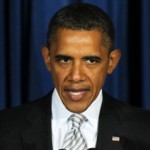 WASHINGTON — Intervening in a volatile and brutal crisis, President Barack Obama said Friday he has dispatched 100 U.S. troops to central Africa to support a years-long fight against a guerrilla group accused of horrific atrocities. Obama said they were sent to advise, not engage in combat, unless forced to defend themselves.
WASHINGTON — Intervening in a volatile and brutal crisis, President Barack Obama said Friday he has dispatched 100 U.S. troops to central Africa to support a years-long fight against a guerrilla group accused of horrific atrocities. Obama said they were sent to advise, not engage in combat, unless forced to defend themselves.
In a letter to Congress, Obama said the troops will act as advisers in a long-running battle against the Lord’s Resistance Army, considered one of Africa’s most ruthless rebel groups, and help to hunt down its notorious leader, Joseph Kony.
The first of the troops arrived in Uganda on Wednesday, the White House said, and others will be sent to South Sudan, the Central African Republic and the Democratic Republic of the Congo.
While the size of the U.S. footprint is small, Obama’s announcement represents a highly unusual intervention for the United States. Although some American troops are based in Djibouti and small groups of soldiers have been deployed to Somalia, the U.S. traditionally has been reluctant to commit forces to help African nations put down insurgencies.
It demonstrates the Obama administration’s escalating attention to and fears about security risks in Africa, including terror networks, piracy and unstable nations. The move was intended to show some engagement to lessen the impact of one of the worst protracted wars in Africa.
Obama declared his decision to send troops as in keeping with the national security interests of the United States. The White House announced it in a low-key fashion, releasing the Obama notification and justification of the troop deployment that the president sent to congressional leaders.
There are and have been other U.S. forces in Uganda in the past and that will likely continue during and after this mission. The numbers have fluctuated, based on requirements, but generally there have been fewer than 100 troops.
Pentagon officials said the bulk of the fresh deployment will be of special operations troops, who will provide security and combat training to African units. The move raises the profile of U.S. involvement on the continent – and represents an apparent victory for administration officials who have argued for more robust intervention in humanitarian crises.
The change in policy could reflect the long-standing concerns of a number of high-ranking Obama advisers left scarred by the U.S. failure in the 1990s to intervene to stop the genocide in Rwanda and the belated action to finally halt the violence in Bosnia. For a current parallel, the Lord’s Resistance Army’s 24-year campaign of rebellion, rape and murder represents one of the world’s worst human rights crises today.
« The request for forces long predates today’s announcement, » Pentagon spokesman George Little said. « This effort is specifically an extension of the Lord’s Resistance Army Disarmament and Northern Uganda Recovery Act of 2009, which President Obama signed into law on May 25, 2010. Until recently, the required forces were not available to fulfill this requirement. »
Richard Downie, an Africa expert at the Center for Strategic and International Studies in Washington called the case « somewhat exceptional. There are few more clear-cut cases of evil in the world today than the Lord’s Resistance Army. »
Downie noted that the U.S. has once before, at the end of 2008, sent advisers and logistical backup to help the Ugandan army root out the LRA. Intelligence leaks, poor cooperation between the Ugandan and other African armies, and bad weather hampered the operation.
Since then, nearly 400,000 people in northern Congo have been displaced due to the LRA’s activity, he said. Downie cautioned that the operation shouldn’t be viewed as short-term. Even if the LRA is disbanded quickly, the effects of years of war will require lengthy rehabilitation efforts.
Coming off the administration’s successful, if limited, intervention in Libya, the Uganda deployment represents a continued effort by Obama to use military force for humanitarian protection in areas where atrocities are occurring. Sending 100 troops may not be significant in terms of military numbers, but the composition of the force gives the United States a new counterterrorism foothold in a region of the world with terrorist networks, pirates and unstable nations.
A special forces unit can be highly effective beyond what the number of soldiers might suggest. They are highly skilled in disrupting insurgency networks by discovering where rebels are based and how they procure guns, money and other logistical support.
Obama’s letter to Congress said the deployment « furthers U.S. national security interests and foreign policy and will be a significant contribution toward counter-LRA efforts in central Africa. »
The Lord’s Resistance Army has been pushing westward since it began its attacks years go, and the administration and human rights groups say its atrocities have left thousands dead and have put as many as 300,000 Africans to flight. They have charged the group with seizing children to bolster its ranks of soldiers and sometimes forcing them to become sex slaves.
Kony is wanted by the International Criminal Court under a 2005 warrant for crimes against humanity in his native Uganda. A self-styled prophet, who mixes Christian mysticism with politics, he is believed hiding along the Sudan-Congo border.
The deployment drew support from Sen. James Inhofe, R-Okla., who has visited the region.
« I have witnessed firsthand the devastation caused by the LRA, and this will help end Kony’s heinous acts that have created a human rights crisis in Africa, » he said in a statement. « Today’s action offers hope that the end of the LRA is in sight. »
But Sen. John McCain, R-Ariz., while praising the goal of combating the Lord’s Resistance Army, cautioned that some past deployments with humanitarian goals resulted in unintended tragedies.
« For this reason, it is essential for the president to consult with Congress about any deployment of our military forces into harm’s way, » McCain said. « I regret that this was not done in the case of today’s announced deployment of U.S. troops to central Africa, and I urge the president to keep Congress and the American people fully informed. »
Obama’s letter stressed the limited nature of the deployment.
« Our forces will provide information, advice and assistance to select partner nation forces, » it said. « Although the U.S. forces are combat-equipped, they will … not themselves engage LRA forces unless necessary for self-defense. »
Most of the troops will deploy to regional capitals to work with government officials and military commanders on countering the rebels and protecting civilians, Pentagon officials said.
In recent months, the administration has stepped up its support for Uganda, which has played a key role in battling extremists in Somalia.
In June, the Pentagon moved to send nearly $45 million in military equipment to Uganda and Burundi. The aid included four small drones, body armor and night-vision and communications gear and is being used in the fight against al-Shabab, an al-Qaida-linked group that U.S. officials see as an increasing threat and that African peace-keeping troops in Somalia have been battling to suppress.
At the State Department, officials portrayed the new troop deployment as part of a larger anti-LRA strategy that dates to the Bush administration but also includes legislation passed by Congress this year.
Victoria Nuland, a department spokeswoman, said the U.S. troops will aid in « pursuing the LRA and seeking to bring top commanders to justice. » The broader effort includes encouraging rebel fighters to defect, disarm and return to their homes, she said.
The administration briefed human rights activists ahead of the announcement, and the groups’ officials were encouraged.
« These advisers can make a positive difference on the ground by keeping civilians safe and improving military operations to apprehend the LRA’s top commanders, » said Paul Ronan, director of the group Advocacy at Resolve.
Col. Felix Kulayigye, Uganda’s military spokesman, said of the troops: « We are aware that they are coming. We are happy about it. We look forward to working with them and eliminating Kony and his fighters. »
huffingtonpost



